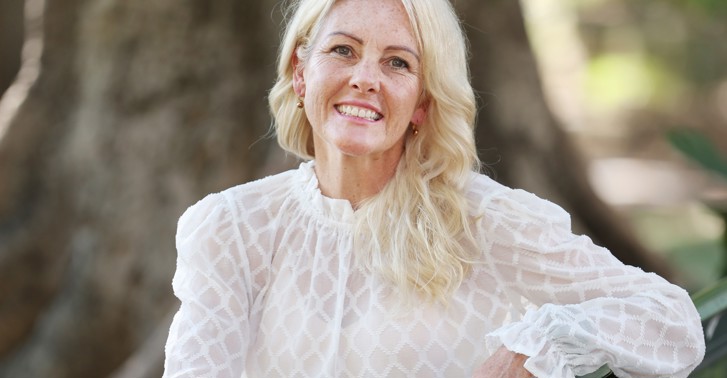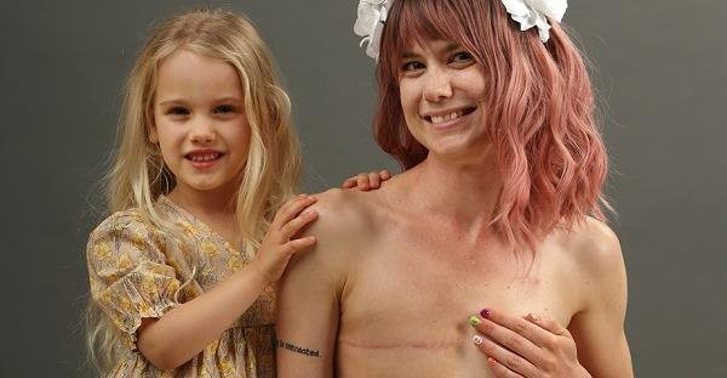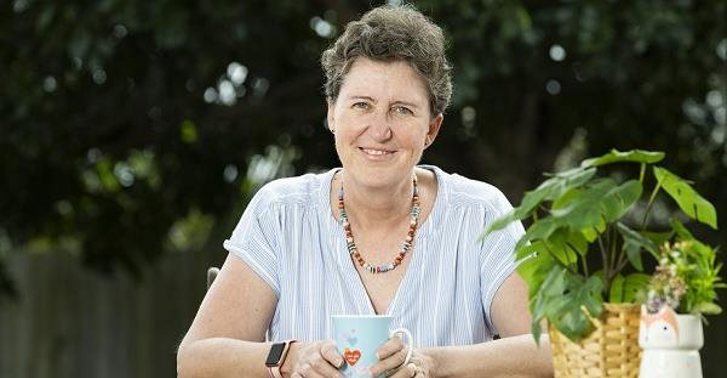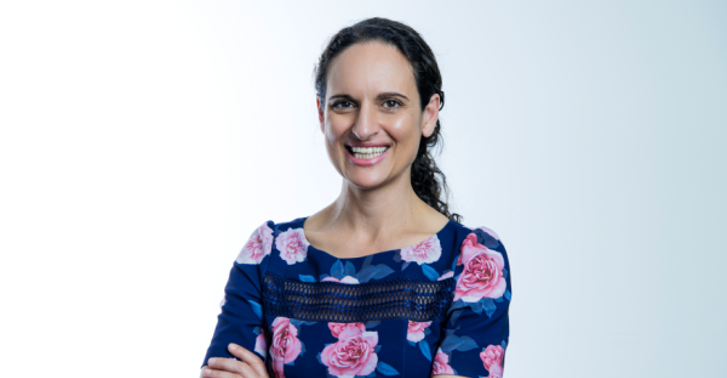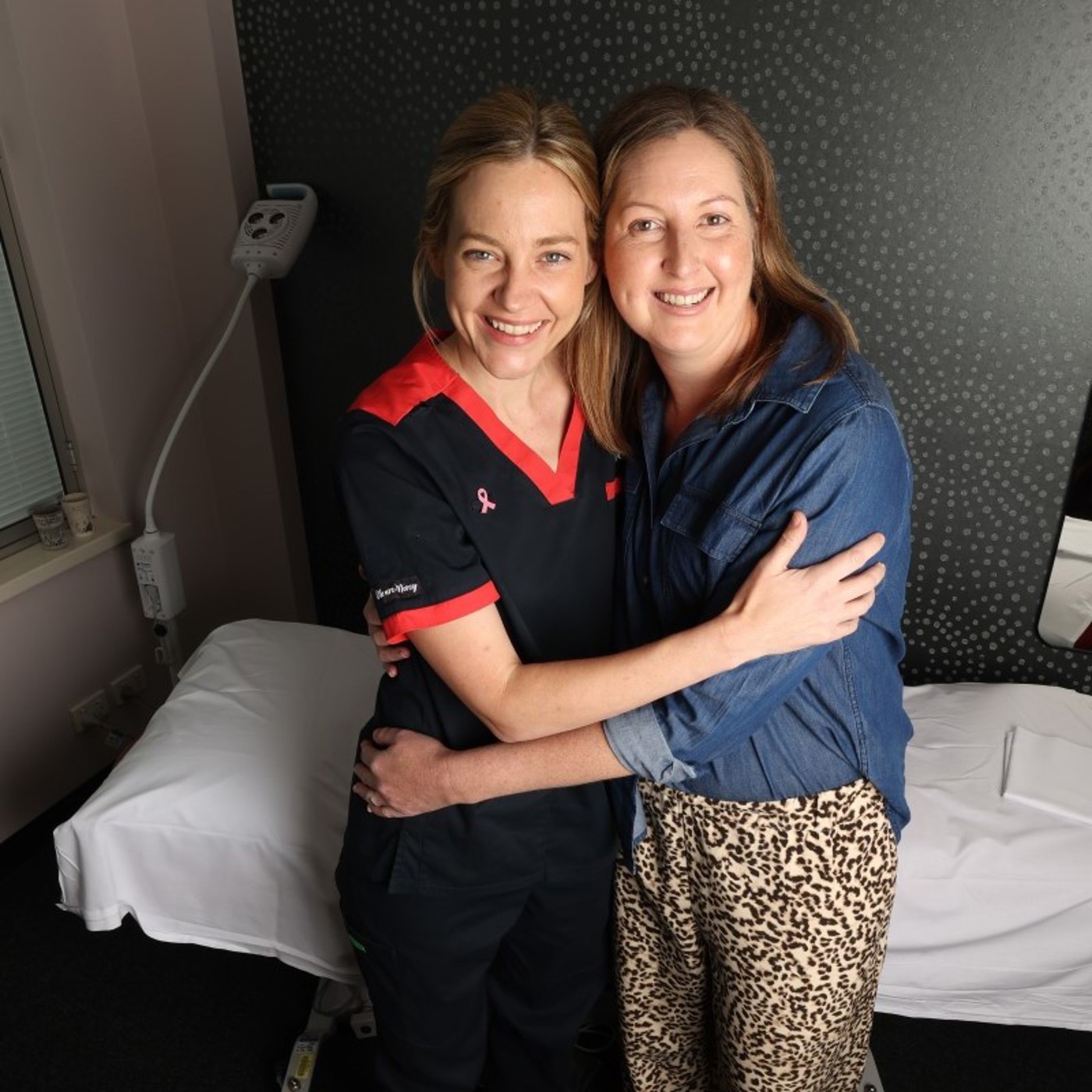
Leading breast cancer care for every Queenslander
One in four women diagnosed with breast cancer in Queensland receive care at Mater — and we support them every step of the way. From early detection and diagnosis through to treatment and recovery, our multidisciplinary teams deliver personalised care that puts each patient’s needs first. It is care grounded in clinical excellence, delivered with compassion and backed by world-class research and a team of generous supporters. Together, we’re driving better outcomes for women across the state.
Breast checks
Up to 50 per cent of women diagnosed with breast cancer discover it through self-examination. This means self-examination and becoming familiar with your breasts is vital for you to recognise any changes - it's the key to early detection.
Remember, finding a lump doesn’t mean that you have cancer. Most lumps are benign (non-cancerous), so don’t panic if you notice a change or feel anything that doesn't seem 'normal for your breasts'. If you do find a change, it's important to make an appointment with your doctor.
Diagnosis and treatment pathways at Mater
Mater Private Hospital Brisbane is one of Queensland’s leading centres for breast cancer treatment. An accredited Centre of Excellence in Breast Treatment, the hospital supports around 500 new patients each year and performs more than 100 breast reconstructions annually.
Mater provides statewide breast cancer care across Queensland, offering personalised treatment and support through a network of hospitals and specialist teams in Brisbane, Mackay, Rockhampton, Townsville, Springfield and Redland.
This network is supported by the expert teams and advanced resources of Mater South Brisbane, where patients across Queensland can access specialist treatment, personalised survivorship plans and telehealth services through the Mater Cancer Care Centre.
At Mater, we work together to help you every step of the way, ensuring your treatment journey is as smooth as possible.
Our multidisciplinary team includes:
- Breast surgeons
- Plastic surgeons
- Clinical nurse consultants
- Medical oncologists
- Pathologists
- Radiation oncologists
- Dietitians
- Occupational therapists
- Physiotherapists
- Social workers
- Psychologists and psychiatrists
Breast check FAQs
How often should I do self-exam?
Adult women of all ages are encouraged to perform breast self-exams at least once a month. The purpose of a breast self-exam is to become familiar with the way your breasts normally look and feel, so that you can identify any changes or abnormalities in your breasts, such as a new lump or skin changes. Breasts will change depending on a woman’s cycle, which is why “same time of the month” breast checks are encouraged. One way to remember is to do a breast check on the first of every month.
Any changes in your breasts discovered during a breast self-exam should be reported to your doctor right away.
Can a benign lump turn into cancer?
No. A benign lump is not cancerous and cannot turn into cancer. However, it is important to make sure that the lump is benign in the first place as some breast cancers may be mistaken for benign lumps. If you notice any new or unusual lumps in your breast, you should see your doctor as soon as possible for a clinical breast examination and further tests, such as a mammogram, ultrasound, or biopsy. These tests can confirm whether the lump is benign or malignant and help you decide on the best course of action.
Are most breast changes due to cancer?
No. Most breast changes are not due to cancer, but to benign conditions, such as fibrocystic breast disease, mastitis, cysts, fibroadenomas or hormonal fluctuations. These conditions can cause lumps, swelling, pain, tenderness or nipple discharge in the breasts. However, some breast changes may be signs of breast cancer, such as:
A new lump or lumpiness, especially if it is only in one breast.
A change in the size or shape of your breast.
Should I get genetic testing for breast cancer?
Genetic testing for breast cancer is not recommended for everyone as most breast cancers are not caused by inherited gene mutations. Genetic testing may be considered for you if you have a personal or family history of breast cancer that suggests a higher risk of having a gene mutation, such as:
Having breast cancer before the age of 45.
Having breast cancer in both breasts or more than one type of cancer.
Having ovarian cancer or male breast cancer at any age.
Having two or more close relatives with breast or ovarian cancer, especially if diagnosed before the age of 50.
Having Ashkenazi Jewish ancestry and a personal or family history of breast or ovarian cancer.
Breast care FAQs
What treatments are used for breast cancer?
The treatment for breast cancer depends on the type and stage of the cancer, the presence of certain receptors on the cancer cells, your overall health and your personal preferences.
Some of the common treatments for breast cancer are:
Surgery
This involves removing the cancerous tissue from the breast and sometimes the nearby lymph nodes. Surgery can be breast-conserving (removing the cancer and some surrounding healthy tissue) or mastectomy (removing the entire breast tissue). Some women may also have a breast reconstruction after surgery.Chemotherapy
This uses drugs to kill or stop the growth of cancer cells. Chemotherapy may be given before or after surgery.Radiation therapy
This uses high-energy rays to destroy cancer cells. Radiation therapy may be given after surgery to kill any remaining cancer.Hormone therapy
This is used for hormone receptor-positive breast cancers, which grow in response to hormones such as oestrogen and progesterone. Hormone therapy blocks the action of these hormones or lowers their levels in the body. Hormone therapy may be given after surgery to prevent recurrence.Targeted therapy
This is used for certain types of breast cancer with specific characteristics, such as HER2-positive breast cancer. Targeted therapy drugs target these specific features and block their growth or destroy them. Targeted therapy may be used in combination with chemotherapy, hormone therapy or on its own.
What should I expect at my first Mater appointment?
Your first visit is an important step in your care journey. The team at Mater is committed to making you feel supported, informed, and comfortable.
What Will Happen
- Check-in: When you arrive, the reception team will greet you, confirm your details, and help with any forms.
- Consultation: You’ll meet with a doctor in the consulting rooms to talk about your diagnosis and discuss a personalised treatment plan.
- Support: A nurse may also be present to help explain things and answer questions. If treatment is needed, education will be provided before it begins.
- Next Steps: Before leaving, make sure to book any follow-up appointments.
What to Bring
- Your Medicare card, health insurance card, and concession card (if you have them)
- Any referrals and a list of current medications (including supplements or over-the-counter items)
- A pen and paper to take notes
- Something to keep you occupied (e.g. book, knitting, tablet)
- Snacks or preferred food items
- Comfortable, loose clothing (especially for treatment days)
- Diabetes medications, if applicable
- A support person – they’re welcome to join discussions (with your permission) and help you get home safely
Helpful Tips
- It’s normal to feel anxious—bring someone you trust for emotional support.
- The team is there to answer any questions, so don’t hesitate to ask.
- Your care will be tailored to your needs, and you’ll be supported every step of the way.
What are the side effects of breast cancer treatment?
Breast cancer treatment can affect everyone differently. It’s important to know what to expect so you can feel more prepared and supported throughout your journey.
Common Physical Side Effects
- Tiredness (Fatigue): Feeling very tired is common and can last for a while.
- Nausea or Vomiting: Some treatments may upset your stomach, but medications can help.
- Hair Loss: Chemotherapy may cause hair to fall out, but it usually grows back after treatment.
- Skin Changes: Your skin may become dry, sensitive, or irritated, especially with radiation.
- Swelling (Lymphoedema): This can happen if lymph nodes are removed or damaged.
- Menopause Symptoms: Hot flushes, mood changes, and vaginal dryness may occur.
- Weight Changes: You might gain or lose weight depending on your treatment and lifestyle.
- Pain or Discomfort: You may feel sore in your joints, muscles, or where you had surgery.
Emotional and Mental Effects
- Feeling Anxious or Low: It’s normal to feel overwhelmed or emotional.
- ‘Chemo Brain’: Some people notice changes in memory or concentration.
- Body Image Concerns: Changes to your body can affect how you feel about yourself.
Long-Term Effects
Some side effects may continue after treatment or appear later, such as:
- Ongoing tiredness
- Nerve pain or tingling
- Changes to heart or bone health
- Fertility issues
What will my breasts look like after treatment/surgery ?
How your breasts look after treatment/surgery depends on the type of treatment/surgery you have, as well as the size of your breast and your body shape.
Some possible outcomes are:
- After breast-conserving surgery, the size and position of the scar will depend on how much tissue is removed. The scar will usually be less than 10cm. The breast may change shape or size slightly, but it will usually look similar to how it did before surgery.
- After a mastectomy, the scar will be across the skin of the chest. If you have surgery to the lymph nodes, the scar will also be in the armpit. You may choose to have a breast reconstruction using implants or your own tissue, or to wear a breast prosthesis.
- After a nipple-sparing mastectomy, the nipple and areola will be preserved, but the breast tissue will be removed. You may choose to have a breast reconstruction using implants or your own tissue. The nipple may lose some sensation or change in appearance.
Breast check FAQs
How often should I do self-exam?
Adult women of all ages are encouraged to perform breast self-exams at least once a month. The purpose of a breast self-exam is to become familiar with the way your breasts normally look and feel, so that you can identify any changes or abnormalities in your breasts, such as a new lump or skin changes. Breasts will change depending on a woman’s cycle, which is why “same time of the month” breast checks are encouraged. One way to remember is to do a breast check on the first of every month.
Any changes in your breasts discovered during a breast self-exam should be reported to your doctor right away.
Can a benign lump turn into cancer?
No. A benign lump is not cancerous and cannot turn into cancer. However, it is important to make sure that the lump is benign in the first place as some breast cancers may be mistaken for benign lumps. If you notice any new or unusual lumps in your breast, you should see your doctor as soon as possible for a clinical breast examination and further tests, such as a mammogram, ultrasound, or biopsy. These tests can confirm whether the lump is benign or malignant and help you decide on the best course of action.
Are most breast changes due to cancer?
No. Most breast changes are not due to cancer, but to benign conditions, such as fibrocystic breast disease, mastitis, cysts, fibroadenomas or hormonal fluctuations. These conditions can cause lumps, swelling, pain, tenderness or nipple discharge in the breasts. However, some breast changes may be signs of breast cancer, such as:
A new lump or lumpiness, especially if it is only in one breast.
A change in the size or shape of your breast.
Should I get genetic testing for breast cancer?
Genetic testing for breast cancer is not recommended for everyone as most breast cancers are not caused by inherited gene mutations. Genetic testing may be considered for you if you have a personal or family history of breast cancer that suggests a higher risk of having a gene mutation, such as:
Having breast cancer before the age of 45.
Having breast cancer in both breasts or more than one type of cancer.
Having ovarian cancer or male breast cancer at any age.
Having two or more close relatives with breast or ovarian cancer, especially if diagnosed before the age of 50.
Having Ashkenazi Jewish ancestry and a personal or family history of breast or ovarian cancer.
Breast care FAQs
What treatments are used for breast cancer?
The treatment for breast cancer depends on the type and stage of the cancer, the presence of certain receptors on the cancer cells, your overall health and your personal preferences.
Some of the common treatments for breast cancer are:
Surgery
This involves removing the cancerous tissue from the breast and sometimes the nearby lymph nodes. Surgery can be breast-conserving (removing the cancer and some surrounding healthy tissue) or mastectomy (removing the entire breast tissue). Some women may also have a breast reconstruction after surgery.Chemotherapy
This uses drugs to kill or stop the growth of cancer cells. Chemotherapy may be given before or after surgery.Radiation therapy
This uses high-energy rays to destroy cancer cells. Radiation therapy may be given after surgery to kill any remaining cancer.Hormone therapy
This is used for hormone receptor-positive breast cancers, which grow in response to hormones such as oestrogen and progesterone. Hormone therapy blocks the action of these hormones or lowers their levels in the body. Hormone therapy may be given after surgery to prevent recurrence.Targeted therapy
This is used for certain types of breast cancer with specific characteristics, such as HER2-positive breast cancer. Targeted therapy drugs target these specific features and block their growth or destroy them. Targeted therapy may be used in combination with chemotherapy, hormone therapy or on its own.
What should I expect at my first Mater appointment?
Your first visit is an important step in your care journey. The team at Mater is committed to making you feel supported, informed, and comfortable.
What Will Happen
- Check-in: When you arrive, the reception team will greet you, confirm your details, and help with any forms.
- Consultation: You’ll meet with a doctor in the consulting rooms to talk about your diagnosis and discuss a personalised treatment plan.
- Support: A nurse may also be present to help explain things and answer questions. If treatment is needed, education will be provided before it begins.
- Next Steps: Before leaving, make sure to book any follow-up appointments.
What to Bring
- Your Medicare card, health insurance card, and concession card (if you have them)
- Any referrals and a list of current medications (including supplements or over-the-counter items)
- A pen and paper to take notes
- Something to keep you occupied (e.g. book, knitting, tablet)
- Snacks or preferred food items
- Comfortable, loose clothing (especially for treatment days)
- Diabetes medications, if applicable
- A support person – they’re welcome to join discussions (with your permission) and help you get home safely
Helpful Tips
- It’s normal to feel anxious—bring someone you trust for emotional support.
- The team is there to answer any questions, so don’t hesitate to ask.
- Your care will be tailored to your needs, and you’ll be supported every step of the way.
What are the side effects of breast cancer treatment?
Breast cancer treatment can affect everyone differently. It’s important to know what to expect so you can feel more prepared and supported throughout your journey.
Common Physical Side Effects
- Tiredness (Fatigue): Feeling very tired is common and can last for a while.
- Nausea or Vomiting: Some treatments may upset your stomach, but medications can help.
- Hair Loss: Chemotherapy may cause hair to fall out, but it usually grows back after treatment.
- Skin Changes: Your skin may become dry, sensitive, or irritated, especially with radiation.
- Swelling (Lymphoedema): This can happen if lymph nodes are removed or damaged.
- Menopause Symptoms: Hot flushes, mood changes, and vaginal dryness may occur.
- Weight Changes: You might gain or lose weight depending on your treatment and lifestyle.
- Pain or Discomfort: You may feel sore in your joints, muscles, or where you had surgery.
Emotional and Mental Effects
- Feeling Anxious or Low: It’s normal to feel overwhelmed or emotional.
- ‘Chemo Brain’: Some people notice changes in memory or concentration.
- Body Image Concerns: Changes to your body can affect how you feel about yourself.
Long-Term Effects
Some side effects may continue after treatment or appear later, such as:
- Ongoing tiredness
- Nerve pain or tingling
- Changes to heart or bone health
- Fertility issues
What will my breasts look like after treatment/surgery ?
How your breasts look after treatment/surgery depends on the type of treatment/surgery you have, as well as the size of your breast and your body shape.
Some possible outcomes are:
- After breast-conserving surgery, the size and position of the scar will depend on how much tissue is removed. The scar will usually be less than 10cm. The breast may change shape or size slightly, but it will usually look similar to how it did before surgery.
- After a mastectomy, the scar will be across the skin of the chest. If you have surgery to the lymph nodes, the scar will also be in the armpit. You may choose to have a breast reconstruction using implants or your own tissue, or to wear a breast prosthesis.
- After a nipple-sparing mastectomy, the nipple and areola will be preserved, but the breast tissue will be removed. You may choose to have a breast reconstruction using implants or your own tissue. The nipple may lose some sensation or change in appearance.
Supporting the journey beyond cancer
Finished active cancer treatment? Our statewide Cancer Survivorship Service supports your health and wellbeing, helping you take confident steps toward recovery and embrace a vibrant life beyond cancer. Our team are available to guide you through the physical, emotional and lifestyle changes that may follow cancer treatment, including:
- Physical health: Peripheral neuropathy or lymphoedema, bone and muscle health, menopause or perimenopause, diet and weight management.
- Emotional wellbeing: Fear of cancer recurrence, mood changes, and difficulties with memory or concentration.
- Lifestyle: Returning to work or study, sexuality or intimacy, self-esteem, body image and confidence.
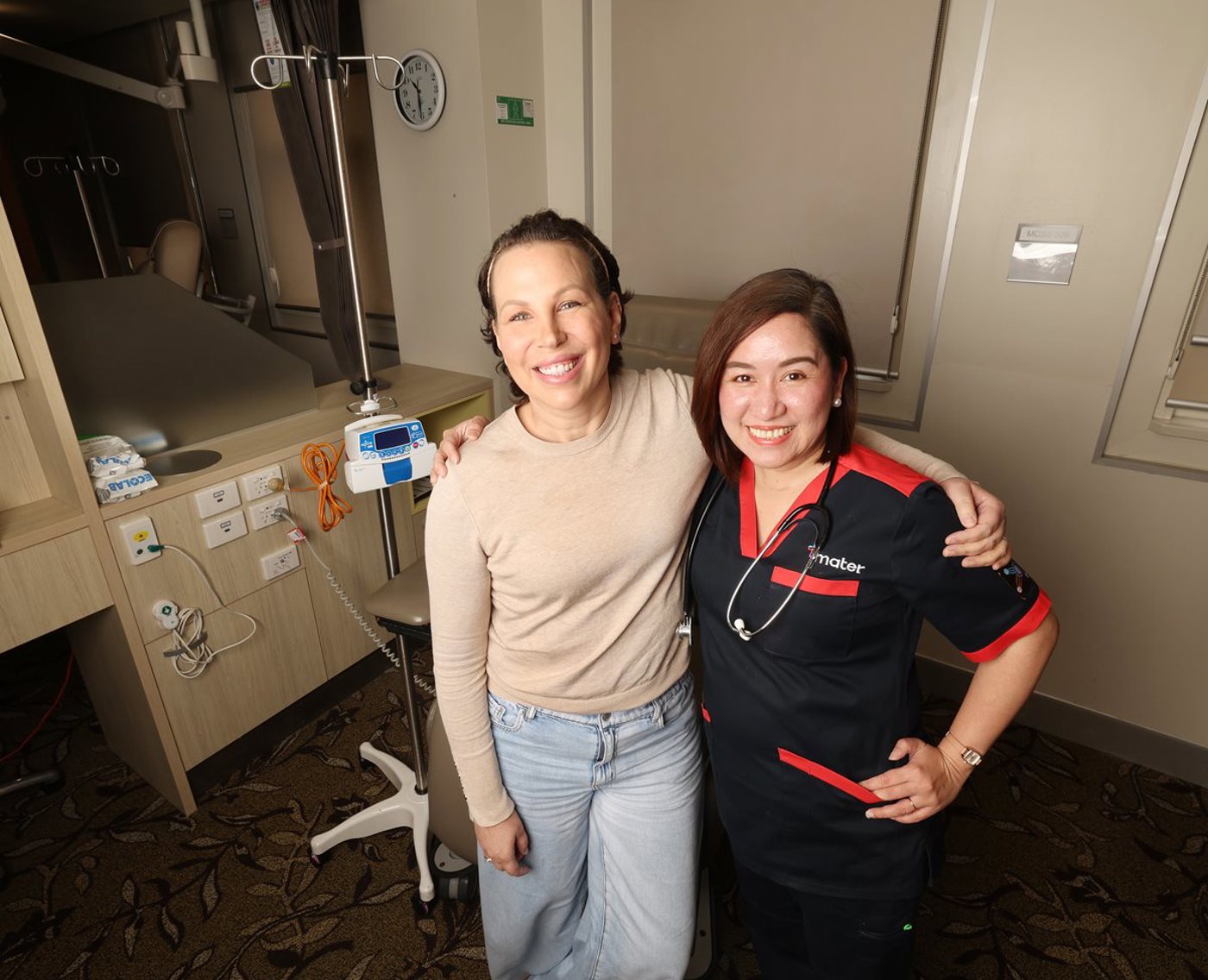
Support us to support Queenslanders
Through the generosity of our community of supporters, Mater’s collective expertise across health, education, and research is driving better outcomes for women throughout Queensland.
Discover how Mater Research is advancing the understanding and treatment of breast cancer.
Through Mater Foundation's Mater Chicks in Pink provide practical support services to women with breast cancer.
